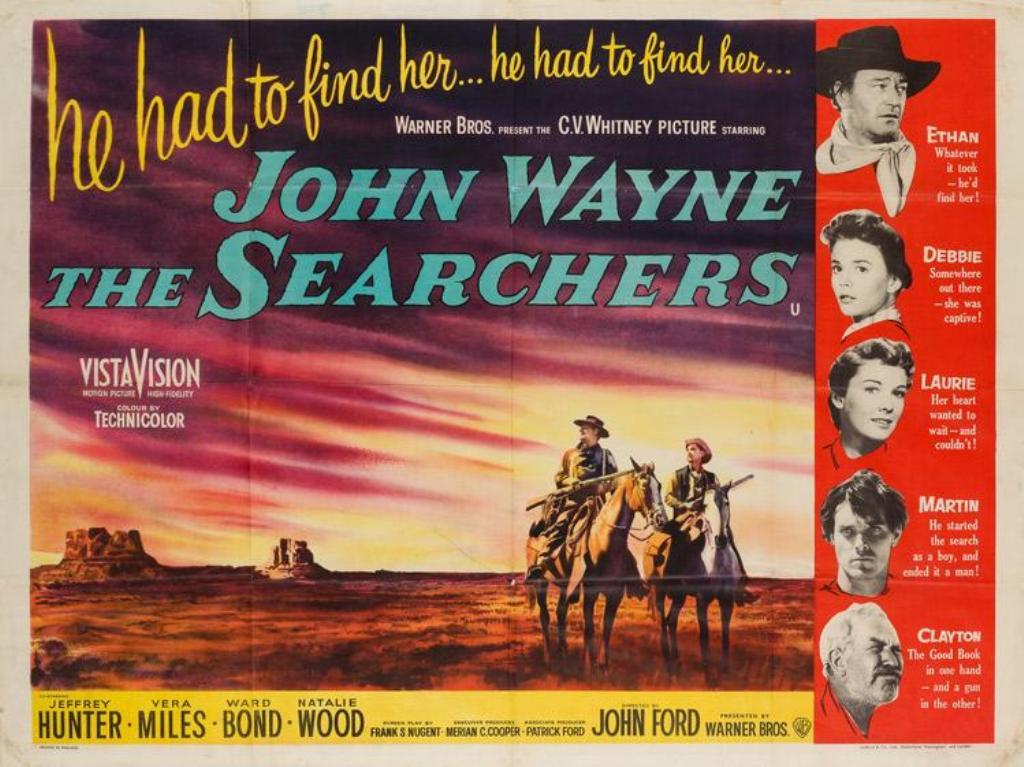I never really watched many western films with plots based around Native Americans when I was a kid. Not even The Searchers. I kinda knew, at a fundamental level, that most of those films had something of a simmering undercurrent of racism that would leave a bad taste in my mouth. Even after I got older, and started hearing people talking about The Searchers in particular as one of the best Westerns, if not one of the best films of all time, I couldn’t quite quell those lingering doubts. However, after much deliberation, this year I decided to get around to watching this movie.
So, The Searchers has something of a reputation as one of the earliest Deconstructionist Westerns. It’s one that tries to be frank when it comes to the historical dealings between White Settlers and Native Americans, but ultimately it just can’t shed the trappings of earlier Westerns.
The film stars John Wayne (who needs no introduction) as Ethan Edwards and Jeffery Hunter (Capt. Christopher Pike in the TOS episode “The Cage”) as Martin Pawley. Edwards is a former Confederate soldier who was unwilling to accept the Confederate surrender and is implied to have gone south to fight in Mexico for the French (in other words, the white side), before returning to Texas after that went bad.
Edwards intended to settle down with his brother’s family, only for the homestead to be attacked by Comanche not long later, while Martin and Edwards are part of a posse chasing down some cattle rustlers. Most of the family is killed save for the family’s two daughters – Lucy and Debbie – who are kidnapped by the war band. Edwards and Martin pursue, later finding Lucy murdered (and implied to be raped), but Debbie still in the hands of the Indians. The two men continue a pursuit that goes on for years, Edwards seeking revenge, and Martin worried about what will happen to Debbie if he isn’t there when Edwards finds her.
Edwards is shown as having a hatred of the Comanche that goes above and beyond that of the community that surrounds him – at one point desecrating the corpse of a slain warrior to make sure their spirit cannot enter the afterlife. Ultimately, the two find the tribe several years after the raid, with Debbie having grown up in the Comanche tribe, and refusing to go back… and this leads to the film’s problem.
Edwards wants to shoot Debbie because she’s tainted by having gone native and having had sexual intercourse of any kind (consensual or non-consensual) with the leader of that war band, Scar. This is clearly shown as a negative, and I’m with the film so far. However, Debbie, in her one big scene in the film, and in her sole moment of agency, states that she doesn’t want to leave the tribe… and doesn’t provide any elaboration on that point.
Is it that she doesn’t want to leave because she identifies with Comanche society more than white society? Is it because she fears she wouldn’t be accepted? Is it because of abuse from Scar (the leader of the Comanche war band) that makes her fear of the consequences for trying to flee? In older Debbie’s only scene of dialog – she doesn’t say.
This is a problem because in the narrative, as presented in the film, Scar and his war band threw the first punch, and every brutal action carried out by Edwards while being considered excessive by his peers, is something of an equivalent act. It’s like the depiction of torture after 9/11, while in the pursuit of Bin Ladin. The actions were reprehensible, but the argument used to justify the use of torture, under those circumstances, was “They did something just as bad – if not worse – so we have to do this to keep them from doing this again.” and that was enough to allow people to, if not to feel comfortable with it, than to justify it.
Scar gets some dialog later to state that he was a victim of attacks by the Whites in the same way that Pawley was from Native Americans (his homestead was attacked when he was a child, and he was adopted by the Edwards family). However, that dialog comes so late in the film, that it ends up reminding me a lot of the traumatic backstory of the antagonist in Fushigi Yugi, Nakago. At the end of the series, after he’s repeatedly gaslit Yui, the friend of protagonist Miyaka, along with Miyaka herself, we get the 11th-hour revelation that he was an orphan who witnessed the rape and murder of his mother, and who was in turn repeatedly raped. It barely explains his actions, and it does not justify them, as it comes so late that nothing can justify those actions. The same is the case here.
Ultimately, the film ends up coming across a lot like Touch of Evil, a movie that had some incredibly good ideas but ran into dramatic enough issues in the execution that I feel it would fare much better with a remake.
The Searchers is currently available on DVD, Blu-Ray, and Digital from Amazon.com. Purchasing or renting the film (or anything else) through those links helps to support the site.
If you enjoyed this review and would like to read future reviews up to a week early, please consider backing my Patreon. Backers get reviews up to a week early.
Or you can just toss a few bucks in my Ko-Fi Jar if you want to help out but the Patreon isn’t a viable option.
